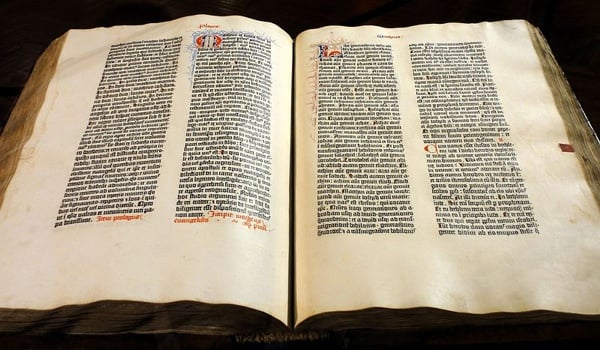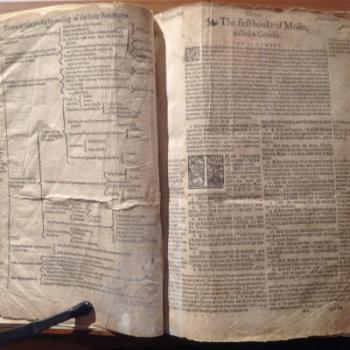Series: The Big Questions
There are a variety of attitudes about what the Bible is. At one extreme the Bible is the only official word of God that contains a list of rules or laws about how we should live. Breaking them sends us to Hell.
At the other extreme the Bible is a book of fiction with no practical meaning. There is nothing beyond death.
Is there a middle ground? Or is the Bible something else altogether? As a person of faith, a practicing Follower of Jesus, and having studied the nature of God extracted from many early religions, the answer depends on the question you ask and your philosophical position in asking the question.

Simple answer
The Bible is what we believe it to be. There is nothing more profound in this life than a preponderance of people choosing to conduct their entire lives based on an ancient book. They believe that God is represented in the writing.
People find whatever they’re looking for in the Bible just as they do in other areas of their lives. If they seek reason for faith or inspiration, they find it. If they want to have a reason to hate others they can get it. Atheists will uncover reasons to be atheists if they seek them.
We might wonder why people don’t choose to live their lives by Grimm’s Fairy Tales. They purport to teach important morals about life. For example: Witches kidnap children. In the Bible Jacob was kidnapped. Witches burn children. In the Bible three were thrown into a furnace. Same stuff, right?
Both are moralistic but only one claims to represent God. People want to know that they are connected to something larger than themselves, and this is conclusively shown in studies.
The complicated answer
One denomination claims that it now has a corrected version of the King James version of the Bible that is error-free. That would be an amazing feat. Christians can’t even agree on which books should even be included in their Hebrew Bible (Old Testament) and the New Testament.
“… the Protestant English Bible comprises 66 books, with the Old Testament consisting of 39 books while the New Testament contains 27 books. The Catholic Bible has a total of 73 books: 43 in the Old Testament and 27 in the New Testament.” How Many Versions Of The Bible Are There?
Ancient manuscripts continue to be found. There are over 5,800 complete or fragmented ancient Greek manuscripts catalogued. In addition, there are 10,000 Latin manuscripts and 9,300 manuscripts in various other ancient languages including Syriac, Slavic, Gothic, Ethiopic, Coptic and Armenian. Some of these date back as far as 125 AD. – Biblical manuscript. It would be nice if they all agreed. They don’t.
Today we have three or four major translations of the Bible. And then there are a lot of versions based on these translations. Which one is correct? Well, groups choose the ones that say what they want. They’re the authority, not the Bible.
When ancient manuscripts don’t agree, who becomes the judge?
Is the Bible inspired by God?
The Apostle Paul writing to Timothy said, “All Scripture is inspired by God [God breathed] and profitable for teaching, for reproof, for correction, for training in righteousness.” (2 Timothy 3:16 (NASB)
Correction means: bringing back, from error or deviation, to a just standard.
Should we base this idea of inspiration on just one verse that says God spoke the Bible into existence? And what do we make of just one verse, the only verse on inspiration?
What does “God breathed” mean? Dictated word for word by God? What does “all scripture” mean? Only the Hebrew Bible existed at the time of the apostles. Why doesn’t this verse mention laws and rules that can’t be broken, and punishment like in the Hebrew Bible?
The attitude throughout Biblical history was that the prophets of ancient Israel were moved by God to speak their prophecies, and these weren’t open to human interpretation. They spoke for God. (2 Peter 1:20-21).
There is scant evidence or authority that says the entire Hebrew Bible was spoken into existence by God. And the New Testament didn’t even exist at the time of the apostles. The Bible is a collection of the letters of the apostles and the sayings of Jesus that circulated and were largely collected between 300 and 400 AD. The New Testament is continuously challenged by new discoveries of ancient manuscripts.
God breathed
I prefer to think of the idea of “God breathed” as meaning that God can bring life to Scripture to reveal to us important things (speak to us) through any religious writing, and also in other writings as well. God is within us and words resonate that are meaningful to us.
The debate will never end over whether the Bible is inspired by God. Some will use this as a hammer to pound what they want to believe into others’ heads. There will always be those who doubt it all. But we can find what resonates if we just read it.
What are the ancients telling us?
I prefer to ask the question: “What were the ancients trying to tell us about God and does it still apply in today’s world?” The Bible is situated at points in time in which there were specific cultures, political activities, religious beliefs, and specific problems. Problems and situations change but human nature stays the same throughout all eras.
The ancients tell us about the influence of God in their lives. They inform us about society’s ills and its heroes. They tell us about their approach to solving problems in the absence of the advanced techniques we have today. They remind us that God is in our lives in a larger presence. To understand and apply this knowledge requires us to have context.
They tell us about a people with whom God made a contract to show right conduct toward others. They tell us especially about the result of harming others and about the need to love others.
And then in the New Testament, God made loving others a way of life available to all. All who reject harming others and accept God’s forgiveness, and love others, are in God’s Kingdom now and always. God demonstrated this way of life through Jesus, who was a representation of God.
Without context we believe things like God sent a bear to kill a bunch of children who were heckling a prophet about his bald head, when in context it was not children but older youth and adults who were planning to kill the prophet and some were likely injured.
Takeaway
The Bible is a book about people’s perceptions of God’s influence and work in their lives. God is love. In applying it to our lives, love is the filter through which we interpret all of it.
Next: What Is the Bible – Part 2, Where the Writings Came From
Similar articles
Bible and Religion – What to Believe?
________________________
The standard of belief and conduct for Christianity is love. God is love. We’re asked to be like God.
________________________
If you find these articles intriguing, please consider joining the mailing list.
If I’ve challenged your thinking, I’ve done my job.
___________________
Our answer is God. God’s answer is us. Together we make the world better.
– Dorian












